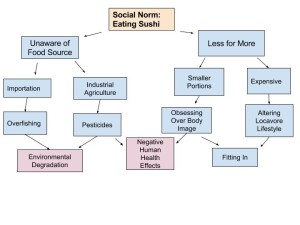1.In high school I started hanging out with a new group of girls that took me to a sushi restaurant in my hometown. This was the first time I tried sushi and I didn’t understand why the portions were so small, but the food was so expensive. I remember being very hungry that night but only ordered one sushi roll because that’s what everyone else ordered. I was not a fan of the raw fish and the tiny portion but acted satisfied because I wanted to fit in. I grew up with a big, plentiful garden in my backyard and primarily ate home grown, local foods. My family rarely went out to dinner and we lived a locavore lifestyle. All of our veggies, meats, eggs, and cheeses came from a good family friend that farmed locally.
2.Although sushi is acknowledged to be a very healthy dish, the sources of ingredients are unknown. China, India, and Indonesia are among the leading rice producers in the world.The modern industrial production of rice is requiring pesticides which can negatively effect consumers and surrounding communities. Sushi is also made with exotic raw fish which correlates to over fishing leading to negative human impacts on the environment. I also felt obligated to eat less because the girls I were with were very self conscious about body image. I went outside of my typical, locally produced diet to please social norms. It is important to know where your food is coming from and although I am one to always try something new, I believe we should be focusing on sustaining the surrounding community’s agriculture, instead of supporting the mass production and globalized food industries. We should also believe in our own virtues and intuitions while being more aware of how social influences are affecting our decision making process.


Cool post, Tawnya. Its great to see another student familiar with the locavore style. I agree with you about sushi, its definitely not for me, all the globally sourced materials aside. I agree its always best to know where your food is coming from. Good for you for supporting your local farmers, its a movement that really needs more traction! Here is a link to my blog if you get a chance http://sites.psu.edu/geog30/2016/03/02/44865/